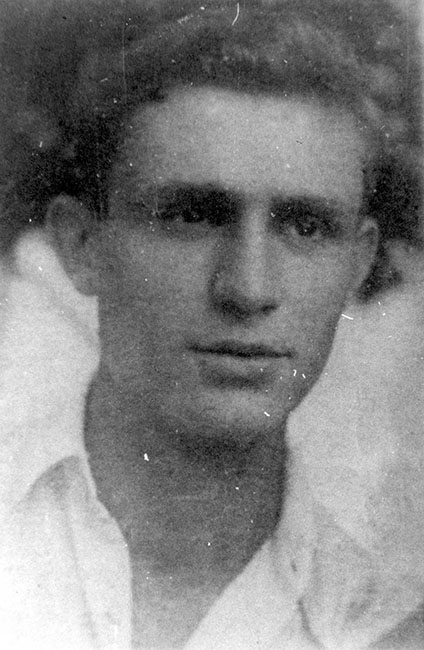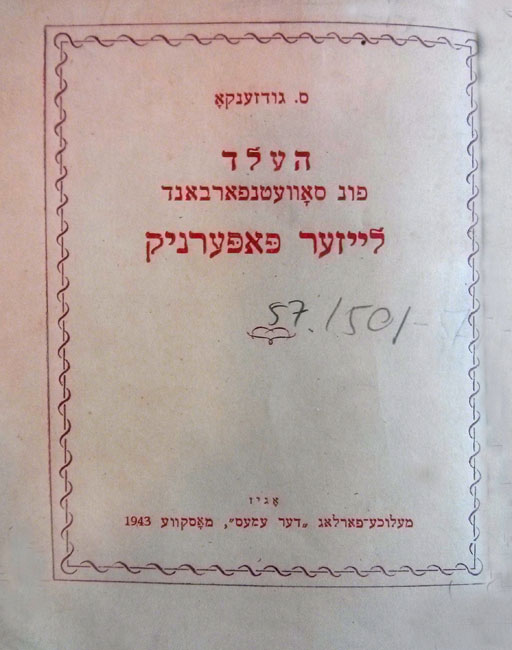Lazar Papernik was born in 1918 in the town of Slavuta, Ukraine. His father worked on the railroad. In 1932 Lazar moved to Moscow and, after completing school, he worked at the First Moscow Clock Factory, becoming a foreman at the factory in the late 1930s. He liked sports, playing football, riding horseback, and bicycling (he even organized a cycling group). While associated with the Civil Defense Organization, Lazar studied combat engineering, which he then taught to young soldiers. When the factory refused to send him to aviation school, he organized a factory club of glider pilots and parachutists, where he learned about flying. He also practiced shooting and became a marksman.
On June 22, 1941, the day Germany attacked the Soviet Union, Papernik volunteered to join the Red Army. On January 23, 1942 a Soviet counter-offensive was launched near the city of Kaluga, south of Moscow. A detachment of 25 camouflaged ski-troops, among them Lazar Papernik, who belonged to the NKVD Special Missions Brigade, infiltrated behind German lines, reaching the village of Khludnevo. Their assignment was to hold the village until the main Soviet troops could join them and to prevent the German troops from being reinforced. The unit attacked superior German forces numbering 400 men, fighting all night. However, the main Soviet attacking forces did not arrive in time. During a night battle the detachment lost most of its members and its commander, Captain Lazniuk, was seriously wounded. Since political commissar Yegorshev, who had replaced him, had been killed as well, Lazar Papernik took over command. After several hours of fighting, after his ammunition ran out, Papernik blew himself up with his last hand grenade, along with the German soldiers who were close to him. Thus, he prevented them from capturing the village. Three days later Soviet troops captured Khludnevo, after which the events of Papernik's heroic death came to light. He was buried along with other members of the unit near the village. Almost all of them were posthumously awarded the Order of Lenin. On July 21, 1942 Lazar Papernik was posthumously awarded the title of Hero of the Soviet Union. Shortly after his death Lazar Papernik became a symbol of the fighter who sacrificed himself for the Soviet homeland. In February 1942 the leading Soviet newspaper Pravda reported the heroic deed of Papernik and his comrades. He was considered by Soviet Jews as one of its major World War II heroes, a source of Jewish national pride. An article titled "Leizer (Lazar) Papernik, Hero of the Soviet Union" by Semion Gudzenko, a Soviet-Jewish poet and war correspondent, that was published on August 5, 1942 in the Jewish Anti-Fascist Committee Yiddish newspaper Eynikayt stressed that, inter alia, he was fighting the Nazis to avenge the murder of the Jewish people. Discussing one of the battles in which Papernik participated, the article stated:
"In this battle he avenged his beloved Ukraine, and his murdered brothers, the thousands of Jews who had been tortured and killed in Kiev and Odessa."
In 1943 a book in Yiddish by Semion Gudzenko with the same title as his article in Eynikayt was published in Moscow by Der Emes Publishing House.
Apparently shortly after the war, a memorial to Lazar Papernik was erected at the First Moscow Clock Factory where he had worked. At the Dzerzhinski Club in Moscow there is a bas-relief created by the Jewish sculptor Iosif Chaikov. Among other scenes it portrays the young clock-maker studying the mechanism of a clock, juxtaposed with Soviet soldiers fighting the Germans. In the center there is the figure of a young fighter under which is written: Hero of the Soviet Union Lazar Papernik. In 1948 a poem in Yiddish dedicated to him and titled "Papernik Street" was written by the young Soviet-Yiddish poet Chaim Beider. Streets in Moscow and Slavuta are named after Lazar Papernik.
Article about Lazar Papernik by Semion Gudzenko
Semion Gudzenko, Soviet-Jewish poet and war correspondent, wrote in his article "Leizer (Lazar) Papernik, Hero of the Soviet Union" (1942), that was prepared to be sent for the Jewish Press in the West:
"… Lazar Papernik took over the command of the small group. 'Not a step backwards' were his orders. The heroic skiers fought courageously and daringly to the last, until Papernik remained alone. He was seriously wounded. For a few minutes all was quiet. Then the enemy headed towards the skiers to rob those already killed and kill those who had only been wounded. But suddenly grenades again began to be hurled in their direction. Papernik's bullets forced them back to their dug-outs. Alone, wounded, he fought against the bloody enemy. His bullets were now giving out, and from the other side, could be heard the shout: 'Hey, Russian, you'd better surrender'; 'Better death than Fascist imprisonment!' – cried Papernik and blew himself up with a hand grenade. After several hours some Red Army men [troops] found him on the edge of the line that he was courageously defending. All around hundred Germans lay dead. Papernik gave his life in battle against the Fascist murderers but before that he succeeded in killing scores of German soldiers.… Papernik's sister, Zinaida Papernik, wrote to the division in which her brother served: 'I am deeply affected by the news of the death of my brother. Dear Comrades, to the end of my days I shall remain grateful to you for putting into the sad official notification of my brother's death so much warmth and brotherly sympathy…. Kindly convey to the men of Captain Lazniuk's unit that we all support those who are going to avenge the death of my brother, and the blood of our heroic skiers. When the enemy will finally be wiped off the face of the earth, a monument will be raised on the grave of the 23 skiers, and relatives, friends, and comrades in battle will come to pay tribute to them….'"
From: GARF 8114-1-92, copy YVA JM/26110.








